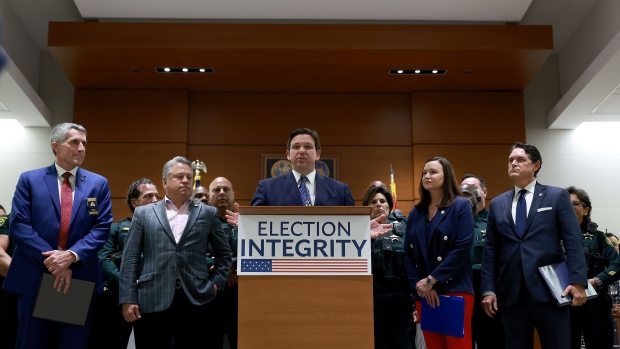Mar 21, 2023
DeSantis’s Election Fraud Police Spur Copycat Efforts in GOP-Led States
, Bloomberg News

(Bloomberg) -- Four Republican-led states are working to add new police agencies specifically to target voter fraud, following the example set by Florida Governor Ron DeSantis.
Florida’s elections cop squad has faltered in its most high-profile cases since launching in July. But that hasn’t slowed down state legislators in Texas, Missouri, Ohio and Arkansas who have proposed bills that would create new police agencies to investigate voter fraud, an exceedingly rare crime typically handled by local police and elections officials.
The proposals under consideration in the legislatures follow national moves by Republican lawmakers over the last three years to criminalize elections law by imbuing prosecutors with new powers, expanding the list of election-related crimes and beefing up punishments for technical violations.
In Missouri and Ohio, the bills would create election police as part of the office of the secretary of state, currently both Republicans. In Arkansas, they would report to the attorney general, a Republican. In Texas, three different bills would create a statewide network of election marshals. Virginia’s Republican attorney general created an Election Integrity Unit last fall as well without the need of legislation.
But experts say Florida’s experience so far with having a dedicated elections police agency does not bode well for the idea.
“What they came up with was a whole lot of nothing,” said Eliza Sweren-Becker, who has been tracking the agency for the Brennan Center for Justice, a nonpartisan group. “It doesn’t seem like they’ve created a model that any state should be following.”
DeSantis, who is gearing up to seek the Republican presidential nomination in 2024, signed the law creating the office at a sports bar near Tampa last April.
The proposal came as he has sought to thread the needle on former President Donald Trump’s false claims that he only lost the 2020 election because of widespread fraud. DeSantis has declined to say whether the election was stolen and defended Florida’s own track record while joining conservative Republicans in claiming voting fraud exists in large enough numbers to warrant its own police force.
Just days before last August’s primary, DeSantis held a press conference flanked by elections police to announce the arrests of 20 former felons on charges of illegally voting, itself a third-degree felony punishable by up to five years in prison and a $5,000 fine. Critics charged that the timing of the announcements was politically motivated.
Those cases quickly ran into problems as they moved to trial, however.
Videos of the arrests taken from police bodycams showed the defendants bewildered by the charges, with many saying they had been told they could vote. Judges dismissed four cases because of jurisdictional issues that have been cleared up by another new law. One defendant accepted a plea deal and a jury found another guilty of lying on his voter registration form, a felony, but not of illegally voting.
Mark Ard, a spokesman for the Florida Department of State, which oversees the election-law enforcement office, said that it has handled hundreds of investigations in its first six months, referring 1,514 cases to another agency and 234 cases to special agents for review. Many of those investigations are still pending.
“This was with a staff of four people,” he said.
Victoria Bassetti, an election law expert at States United Democracy Center, a bipartisan legal watchdog, said that a standalone elections police force can create problems because of its narrow mandate only to root out a rare crime.
Bassetti said elections police may have an incentive to be “overzealous” in going after marginal cases where a voter simply made a mistake because the agency has to show its worth.
Other proposals to create new elections police have been scaled back, as when Georgia decided last year to simply beef up the election-related powers of the existing state bureau of investigation instead. Bassetti said that makes more sense for lawmakers, since it’s more cost-effective.
But supporters of the proposals say that they can help restore voter confidence.
Texas state Senator Paul Bettencourt, the Republican sponsor of a bill to create election marshals, said that the new agency is needed to push back against local elections officials whom he believes aren’t taking state law seriously enough, including in the state’s largest city, Houston, which he represents.
He said the marshals would be able to investigate and press charges against local elections officials who failed to follow proper procedures, which would also give them the authority to make suggestions to local elections officials before voting starts.
“Election marshals would have the power to walk in and say, here’s the state code, I recommend strongly that you do your job,” he said.
(Adds details on Georgia effort in 16th paragraph; an earlier version corrected the spelling of name in sixth paragraph)
©2023 Bloomberg L.P.






